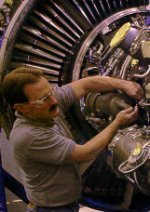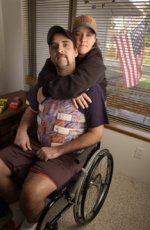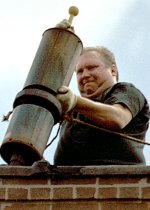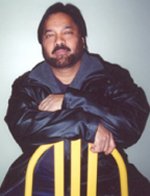German Firm Moves 4,000 Kelowna Jobs to U.S. Auto Industry Squeeze Hits Hard Dutch Vacuum 200 Jobs from Bloomington Normal  North America is the world’s richest industrial economy, with the most productive workforce on earth. But for how much longer? What will be left if we continue selling off our best jobs? Revitalizing North America's Might Return to Contents Page |
Cheap China Wheels
Destroy 600 Los Angeles Jobs From
the foundry where aluminum ingots are melted and formed into rough
wheels to the production area where they are turned into beautiful
finished products, the members at Cesar Chavez Local 1910 work hard to
build a better life. They’ve been through a lot together. American
Racing Custom Wheels is the only manufacturing plant in Los Angeles to
be organized in the last twenty years. It was a long struggle, including
a 72-hour strike before they had any union at all. Today, they have good
wages, paid holidays and vacations, a pension and most important,
medical insurance. Now,
many members are hurting. A downturn in wheel demand by the major car
manufacturers combined with competitive pressure from imports and
nonunion wheel makers has cut employment by half, from a high of 1,200
employees to 600 today. Emilia
Garcia is a veteran of the organizing drive. She’s been out of work
for almost a year. Her sons are all married now, so she is just able to
afford the $185 per month for medical coverage under COBRA, but it’s a
tremendous strain. “Right
now the situation is pretty hard. You don’t have work, you don’t
have money, but you have bills and you have to pay the COBRA. You think,
‘What am I going to do?’ “When
I stopped working, the first thing that came to my mind was ‘How am I
going to pay for all this? The house? The bills? The food?’ “It’s
a big difference not having a union job. After the organizing drive, we
were happy. We had a good salary, benefits, insurance, the credit union
and the 401(k). Until I get back to work, that’s gone,” she says. Manuela
Ortega has been out of work for four months. She lives in a well-kept
house with her husband, four daughters and a son. “When you’re not
working, you don’t get any benefits. This morning, I had to pay the
health clinic $221. We couldn’t afford the $500 a month for the COBRA
insurance, so we have to pay the clinic directly each time I take the
children. It’s worse for them. Many things we used to have we had to
let go. “I’ve
worked all my life and I want to get back to work. I’ve never needed
or asked for help before, never asked for welfare,” said Ortega. “If
Congress could do something about the insurance, that’s the most
important thing for our family.” Back
at the plant, Chief Steward Fernando Villanueva fights to protect jobs.
“There’s a lot of pressure on us. There are non-union shops that pay
half the wages and no benefits. Plus, there are cheap wheels from China.
But we work hard to make a top quality product. We talk to the company
all the time about ways to keep making the wheels here. “We
need some help, though,” said Villanueva. “Why is the government
making it easy for companies to buy products from China? Do they want us
to stop making anything here and just be consumers? If they keep letting
companies buy overseas, there won’t be any jobs left here.”
|




